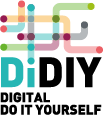Are you a crafter?

A so-called “digital tsunami” is generated by new computing capabilities and rise in digital data generation thanks to the diffusion of disruptive technologies such as additive manufacturing, autonomous robots, data analytics tools and industrial Internet of Things (IoT). Digital technologies are transforming manufacturing value chain, from research and development, supply chain, and factory operations to marketing, sales, and service.
Digital technologies are helping manufacturing firms to connect physical assets altogether thus unleashing a flow of digital data between different departments. Data digitally generated at production level can be accessible throughout the overall organization thanks to a shared and cloud-based infrastructure. Sensors, distributed inside manufacturing lines, are collecting data from the field and populating online database where these “big data” are analyzed in real-time in order to take corrective actions. Lastly, managers and workers are facing a steady introduction of digital technologies (both hardware and software) in their daily activities that puts them in a condition to digitally advance their skills.
Following questions, and related sub-questions, are arising:
- How will the work of a worker in a manufacturing firm be reshaped due to the influence of DiDIY?
- How will the work of a worker in a manufacturing firm change in relation with the evolution of other organizational roles in her firm?
- How Makers’ characteristics (both personal and environmental) can be translated into an organizational context?
- How does these characteristics favor a positive result?
- Do digital technologies favor DiDIY-ers (such as empowering people)? If so, in which situations? If not is technology used for tasks automation only?
DiDIY is characterized by an infrastructural and social nature and it is necessary to explore its impact beyond the changes of the skills of individuals, but also on work and organizations across the industries.
DiDIY, among all its impacts and changes brought at both societal and organizational levels, is reshaping work and organizations due to the interactions between DiDIY-ers (and their aggregations) and their environment. The DiDIY Project wants to investigate, analyze, and understand the current transformations that DiDIY is producing in work and organizations.

